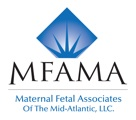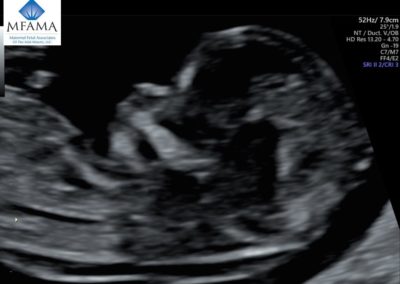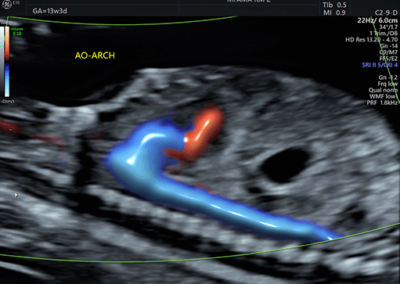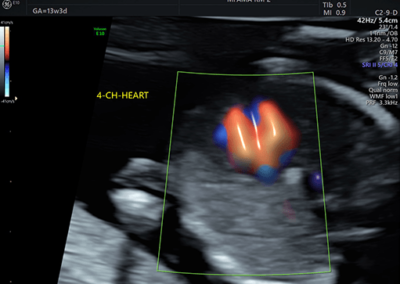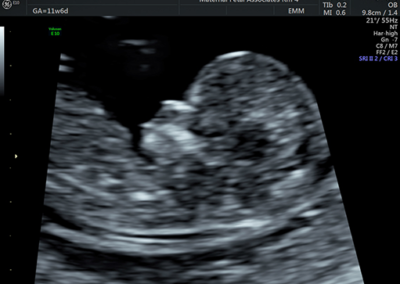Our Services

First Trimester Prenatal Screening
First Trimester detailed ultrasound evaluation with Prenatal Screening:
While the majority of pregnant women will give birth to healthy infants, some may give birth to infants with major physical and mental disabilities. In some infants, the problem is a chromosomal abnormality such as Down syndrome, Trisomy 18 or 13, where there is extra chromosomal material which leads to serious intellectual disability and birth defects. Although any woman can give birth to an infant with a chromosomal abnormality, the risk increases gradually with age.
The gold standard in making the diagnosis of a chromosomal abnormality is amniocentesis or chorionic villous sampling (CVS). These procedures carry small risks of miscarriage (amniocentesis is about 1in 500 and CVS is about 1in 100).
Many women ask about alternatives to amniocentesis or CVS. There is no alternative if the patient or the couple wants 100% accuracy. However, there are non-invasive alternatives referred to as Screening Tests. Available screening tests are either done in the first or the second trimester.
Combined First Trimester screening (CFTS):
This includes a Sonogram done between 11 and 14 weeks and a blood test. The Sonogram evaluates the skin thickness of the baby’s neck known as the Nuchal Translucency (NT), and the baby’s Nasal bone (NB). The blood test measures two substances in your blood known as B-HCG and PAPP-A. With First trimester screening, the detection rate is 91% for Down syndrome, and 97% for Trisomy 18 and 13 with a false positive rate of 5%.
In our practice, we consider the screening result as reassuring if the modified risk comes as 1/1000 or better, borderline if 1/300 to 1/1000, and high risk if 1/300 or more.
Options following CFTS:
- Reassuring result: No further testing is required. Patients that are considered at high risk such as age of 35 years or more, previous infant with Down syndrome or other chromosomal abnormality, or have an abnormal finding on first trimester scan may be offered Cell free DNA (cfDNA) simultaneously.
- Borderline or Intermediate: Genetic counseling, and Cell-free DNA (cfDNA).
- High risk: Genetic counseling to determine the appropriate next step taking into account individual preferences. Options may include noninvasive testing (cfDNA) versus more definitive procedures (CVS or amniocentesis).
Please note the following:
- First trimester screening should be provided after adequate genetic counseling and by an experienced provider that is accredited by the Fetal Medicine Foundation (www.fetalmedicine.com), or the NTQR program (www.ntqr.org ).
- First trimester ultrasound in addition to its role in screening for chromosomal abnormalities will identify more than 50% of fetal malformations. This will allow patients the advantage of making early informative decisions.
- Maternal screening for open Neural tube defect should be offered between 15 and 20 weeks (Maternal serum AFP).
- Anomaly scan/Level 2 ultrasound should be performed around 20 weeks
- Fetal Echocardiogram (detailed fetal heart evaluation) should be offered when there is a thick NT or other risk factor for congenital heart disease.
- ACOG recommends that pregnant woman should have genetic counseling prior to offering any genetic screening tests, and the option to choose invasive diagnostic testing such as CVS or amniocentesis.
MFAMA doctors and sonographers are certified through the FMF and the NTQR. In addition, we provide thorough genetic counseling in all our locations. Our comprehensive first trimester Ultrasound is provided in all our convenient locations. Our physicians and sonographers perform over 3500 first trimester screening ultrasounds annually.
Request an Appointment
We invite you to fill out this form to request an appointment. Our scheduling staff will give you a call within 24 hours. For all urgent needs, please call the office directly.
Submit Your Story
We are compassionate about our patients and want to hear from you. Please share your story by clicking on the link below.
